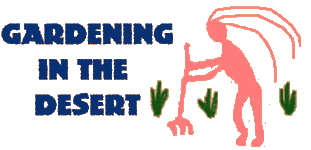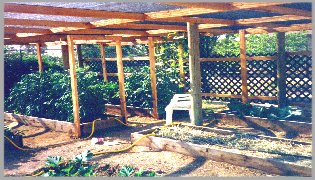

I garden in raised beds made of redwood 2x12s. The beds are small for ease of access. Each one is about 30 inches by 8 feet long. In order to get a larger crop I plant intensively, about 1 1/2 times the number of plants recommended by the experts.
I lay my soaker hoses on top of the ground and mulch over them instead of burying them. This provides better distribution of the water throughout the bed. I prefer hay as a mulch because it breaks down better than straw and makes the garden smell sweet. We till the mulch into the ground in the fall with compost, crushed egg shells, and duck manure. Since we have so little rain we usually water the garden at least twice in the winter to help break down the organic matter we tilled. Prior to planting in the spring we till in chelated iron. It isn't that we don't have iron in the soil. It's there but not in a form readily available to the plants.
Every year I plan to garden without pesticide but I'm afraid I lose my resolve when the tomato hornworms get big enough to have attitude. Until they grow about 2 inches long I handpick them and throw them to the ducks. Ducks think they're a special treat. I just can't bring myself to touch them after they get that big and stand up and glare at me. Then if they have completely stripped the branch I cut the branch and toss it out for the babies if they haven't I kill them instead by swabbing them with a paintbrush dipped in properly diluted pesticide. It's a minimal use of pesticide
My garden is protected by shadecloth over the top and on the east, west, and south sides. This has the advantage of breaking the hot dry summer winds and preserving moisture in the soil. The shade also prevents the vegetables from cooking on the vine. I lost more than one tomato crop to the summer sun before we put up the shadecloth.
I try to pick varieties that are tolerant of high heat. I plant cabbage, spinach, radishes, snap peas and beets in late February and harvest in time to plant green beans and zucchini. I plant tomatoes in mid to late March and shelter them from the cold until the nights are consistantly in the 50s. I prefer indeterminate varieties of tomatoes because they produce longer. A couple of my favorites are Early Girl and Heatwave. I have found that these produce a medium sized tomato that's flavorful and more resistant to cracking. Bush beans produce better for me than vines and don't need to be tied to a trellis. I like to plant Royal Purple bush beans because the color makes them easy to spot plus it amazes my nieces and nephews.
I grow a big bed of mint in the corner. It always produces much more than we can use so I mow it down two or three times a year and use it as green material in the compost bin. It makes the compost smell more pleasant and is a deterrent to many insects. Composting presents a special problem in the desert since it is so hard to keep properly moist. My husband made me a water jet from a piece of pipe and once a month I use that evenly spaced a foot or so out from the center of the bin. I have found compost does best for me if I only turn it twice a season.

The most important thing to remember though is there are lots of nasty things that live in the desert that like my garden as much as I do. I always look before I put my hand anywhere lest I run into one of the desert's less amiable inhabitants like scorpions, black widows or the occasional rattlesnake.

Last but not least, these are some of my 15 ducks. Shown are two Indian Runners, three Rouens, a mallard, and a Rouenner. Once the garden has finished producing we open the gate and let the birds clean up the dying plants.
Shopping Links for Seeds Sources, Gardening Help, and Poultry
One of the best resources for the desert gardener is The Western Garden Book. You can buy the book or get it on a CD. Sunset magazine is also chock full of hints, planting guides, garden plans, and new ideas.Sunset Publishing Corporation
Books, the magazine, projects and plans
During the winter when I lived in Wyoming I used to study seed catalogs,
like a student studies a textbook. I would draw and redraw the plans
for the garden until they were just right and then I place my seed order.
Now I buy Burpee seeds at Walmart but that doesn't stop me from
wanting to study the seed catalogs.
Burpee and Co.
Park Seed Co.
Shepard Seed Co.
Three excellent catalog seed sources
Seeds of Change
A wonderful organic seed site
Redwood City Seed Co.
The world's oldest alternative seed source. Includes many endangered species
Gourmet Gardener
Herbs, vegetables and edible flower seeds
We orginally got ducks because they were supposed to keep the weeds down. We keep them now because the happy duck
noise is such a pleasant thing and because they're nice to watch on a warm
summer evening. These folks sell a great variety of ducks and geese.
Metzer Farms
Common and rare ducks and geese
Home|Village|Recipes|Jewelry|Southern California|About Me
Shopping|Web Building Links
CENTER>
This page hosted by  Get your own Free Home Page
Get your own Free Home Page